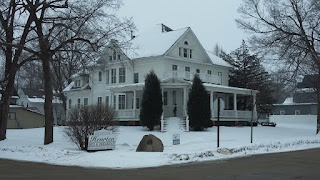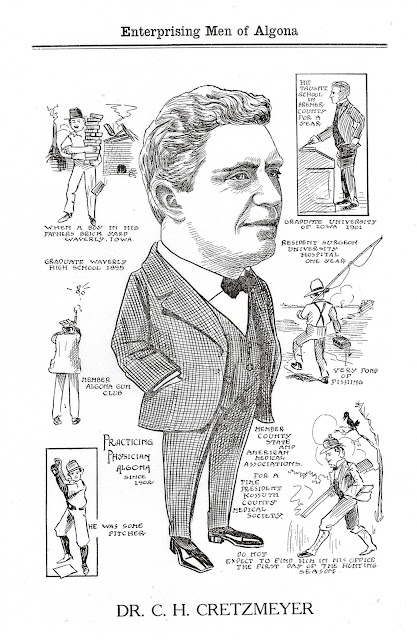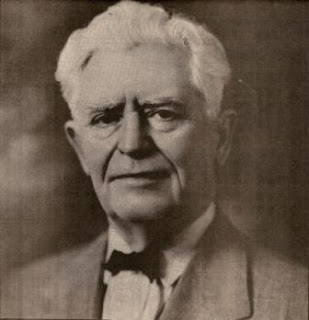“Enterprising
Men of Algona” was a book that was printed by the Upper Des Moines Republican
in 1917. It consisted of 28 cartoons of
well-known Algona businessmen. The
cartoons had been printed in previous issues of the newspaper during 1916-17
before being combined into a book. Each
cartoon featured information about the subject which included hobbies,
background facts and tidbits about their lives.
I find the artwork remarkable—sadly I have been unable to determine the identity
of the artist that created the unique drawings.
From
time to time, I plan to feature one of the enterprising men so that I can share
their story—and their cartoon—with you.
To begin, let’s take a look at enterprising man Dr. C.H. Cretzmeyer. Pictured as a very dapper man, complete with
bow tie, the drawings scattered around the edge of the picture offer a peek
into an active life.
THE DOCTOR COMES TO ALGONA
Born
and raised in Waverly, Charles H. Cretzmeyer taught school for a short time following
graduation from high school before enrolling in the University of Iowa. He graduated from medical school in 1901 and
completed his internship in 1902. At the
time the young doctor was undecided where to set up his practice. During a trip to Chandler, Minnesota, to
visit his grandfather, he had an all-night layover in Algona. Charles had
several acquaintances in the area including Bill Hinchon, a young lawyer. They spoke very highly of the community and
urged him to consider casting his lot here.
Before leaving on the rest of his trip, Dr. Cretzmeyer toured the new
Galbraith building at the corner of Moore and State Streets. He selected several rooms on the second floor
and became John Galbraith’s first tenant.
On April 16, 1902, the doors officially opened. His office would remain in the same spot for
51 years.
The
new doctor set up housekeeping at the Durdall Hotel with unique payment
arrangements. He told proprietor Harry
Tremain “I’m a young doctor. . .I’m going to work here. . I haven’t any money,
but when I have some I’ll pay you.”
Tremain agreed, stating that he looked honest, and that arrangement
lasted until the doctor had a home of his own.
When
reminiscing in his later years, the doctor recalled that in the early days when
he did not have many patients, he would sometimes grab his medical bag and run
out of his office and down the street, hoping that observers would think he was
called out on an emergency. It didn’t
take long for his practice to grow. At
that time he would travel by foot, horseback or buggy over dirt roads. In the spring they were often bottomless mud
pits. Dr. Cretzmeyer would use a cutter
to make his calls during the winter.
HIS FAMILY LIFE
In
March of 1904, Maude Low came to Algona and for the next year worked as a
trimmer in the millinery store of Mrs. James Taylor. She caught the eye of the young doctor and
they were married the next year on her birthday, June 5, 1905. The two were quite devoted to one another and
the marriage was a happy one. However,
Mrs. Cretzmeyer’s health began to fail.
An operation was recommended to relieve her symptoms and Dr. Guthrie of
Dubuque came to perform the surgery.
Complications followed and Maude died on the 9th of December,
1909. Her father took her remains to
Osceola for burial in the family plot.
Dr.
Cretzmeyer did remarry a few years later.
Bertha Henry of Oskaloosa had come to Algona to serve as a piano teacher
and organist in the Methodist Church and had made a large circle of
friends. She and the doctor were married
quietly at the Catholic parsonage by Fr. Halpin on October 14, 1915. Although they attempted to keep the nuptials
quiet, neighbors and friends discovered their plan and as they made their
departure from the parsonage, the couple were showered with rice, cheers and
well wishes. They then drove to Fort
Dodge and caught a train for St. Louis where they spent their honeymoon.
The
couple went on to have two children—Dr. Charles H. Cretzmeyer, Jr., who like
his father became a medical doctor, and their daughter, Jane Cretzmeyer, who
became a teacher.
HIS PRACTICE
Dr.
Cretzmeyer became well known for his surgical skills. Shortly before he died he estimated that he
had performed over 6,000 surgeries during his career. I was amazed to learn how many cataract
surgeries he performed. To think over
100 years ago he was capable of such delicate operations on the eye is very
impressive. He was often called in on
the most dangerous and gruesome of accident cases—a young man who jumped from a
hay mow into a wagon landing on the handle of a pitchfork which punctured his
rectum and colon as well as a railroad fireman who fell off a platform and
beneath the approaching train. Although
he and several other area physicians did everything they could, these patients
did die.
He
had many success stories, however. The
doctor loved to relate the story about a farm hand who came to his office one
hot summer day begging for help for his very sick 11 year old son. Going to the man’s home, Dr. Cretzmeyer found
it to be a tent. An examination of the
child confirmed the physician’s suspicions that he was experiencing an
appendicitis. Despite the flies and
unsanitary conditions, it was imperative that the surgery be performed
immediately. Dr. Cretzmeyer sterilized
his instruments in an old Rochester sterilizer and called upon the assistance
of Dr. Stull who administered ether. They placed the boy on a cleanly scrubbed
old door set atop two salt barrels and the doctor successfully removed a
gangrenous appendix.
Ella
Burke who served as the office nurse for Dr. J. W. McCreery for 25 years,
recalled another incident when a lady who lived near Bode required emergency
surgery in the middle of a very bad winter.
It was a bitterly cold night and Drs. McCreery, Cretzmeyer and Kenefick
were called in. Snow had closed the
roads so they traveled by horse and cutter through the fields, cutting the
fences as necessary. The surgery was
performed by lamplight in the home.
The
delivery of babies also took much of the doctor’s time. Once being called to the home, the
practitioner would stay with the expectant mother until the arrival of the new
little one. This could mean many long
hours monitoring labor.
OUTSTANDING CITIZEN
Charles
was very involved in the community of Algona as well as in the medical
community. He served a term as president
of the Kiwanis club and was a member of the Knights of Columbus. He was a member of the American Medical
Association, the American Association of Railway Surgeons, the Austin-Flint,
Cedar Valley, and Twin Lakes medical societies, and was a past president of the
Kossuth County Medical Society.
He
served as the first Chief of Staff of the new St. Ann’s Hospital and was active
in setting the policies for the facility.
 |
HIS HOME
Bertha
and Charles built a beautiful home which still stands at 400 East Nebraska
Street in Algona and is known as Hearten Bed & Breakfast. An inviting porch wraps around the house
providing the residents a place to catch a soft summer breeze. The home features a staircase with a landing
large enough for the placement of a piano to showcase Bertha’s musical
talent. One can picture the family
seated in the parlor and patients coming by after hours, seeking help from the
good doctor.
At
the time the house was built, Bertha Cretzmeyer special ordered two chandeliers
made from Austrian crystal. The fixtures
featured large amber teardrop crystals at the top surrounded by gold filigree
with icicle-like clear prisms hanging in the lower portions. These two fixtures were later sold along with
other original fixtures.
An
article in the Kossuth County Advance published on November 4, 1920, describes
a Halloween party held at the house. “Seventy-two ladies were delightfully
entertained at a one o’clock luncheon Saturday given by the Mesdames C.H.
Cretzmeyer and F. H. Seiler at the former’s home. The spacious and beautiful Cretzmeyer house
was decorated with yellow chrysanthemums and Halloween conceits in bright
orange. A “witch” showed the ladies
where they were to sit at table. One of
the interesting and amusing features of the afternoon was a fortune-telling
booth. This had been fitted up with
kettle, firelight, and a skeleton borrowed from Doctor Cretzmeyer. The ladies had their fortunes told in
turn. The rest of the afternoon was
spent at bridge.”
THE END OF THE STORY
Charles
continued to practice medicine right up until his passing on Monday, May 6,
1957 at the age of 78. He had suffered a
heart attack late Sunday evening and was rushed to the hospital. A second attack the next day took his
life. Bertha died three years later
following a long illness. Both are
buried in Calvary Cemetery.
William
C. Dewel, a good friend, wrote a tribute at the time of the doctor’s passing
which was published in the Kossuth County Advance on May 7, 1957. He stated, “In both public and private the doctor was upright and faithful to the
best concepts of physician and citizen.
I regard his passing as a symbol of the end of an era in the history and
growth of Algona and Kossuth county. Fifty-five
years ago he came to just another country town, and now he leaves as it is
blossoming into a new era as a rising small city.”
Until next time,
Jean
Until next time,
Jean
If you enjoyed this
post, please don’t forget to “like” and SHARE to Facebook. Not a Facebook
user? Sign up with your email address in the box on the right to have
each post sent directly to you.
Be sure to visit the
KCHB Facebook page for more interesting info about the history of Kossuth
County, Iowa.
Reminder: The posts on Kossuth County History Buff are ©2015-16 by
Jean Kramer. Please use the FB “share” feature instead of
cutting/pasting.


The illustrations done of the doctor and others may have been the work of retailer Theo Chrischilles, who also beautifully illustrated his four years at Beloit College. The doctor's son, also a physician, was a star athlete and held the 100 yard dash record at AHS for decades.
ReplyDeleteThat is great information Denny. It would be nice to be able to confirm it. While I was researching this story, I did find a lot of info about Charles, Jr., and his athletic accomplishments. Thanks for sharing your thoughts!
ReplyDeleteThank you for posting this blog. Niece Jody shared it on FB. Napoleon was my great grandfather. His son Dallas Benham was my grandfather. Jody and my daughter Cami have been very active in geneology.
ReplyDeleteThanks again!
Jeff Benham